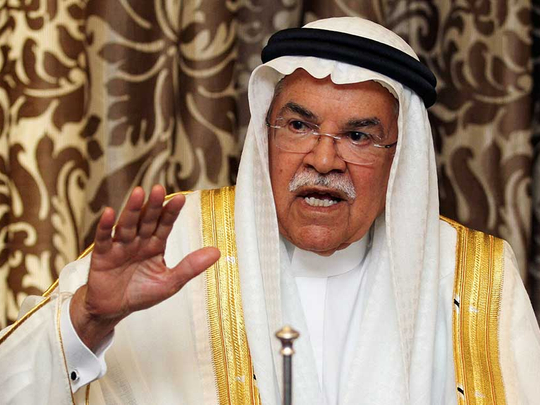
Dubai/Kuwait/London: Saudi Arabian Oil Minister Ali Al Nuaimi, the architect of the 2014 switch in Opec (Organisation of Petroleum Exporting Countries) policy that’s since roiled the energy market, companies and entire economies from Mexico to Nigeria, is leaving his post.
An 80-year-old who rose from modest Bedouin roots, Al Nuaimi headed the ministry for almost 21 years, steering the world’s largest crude exporter through wild price swings, regional wars, technological progress and the rise of climate change as a key policy concern.
“During my seven decades in the industry, I’ve seen oil at under $2 (Dh7.34) a barrel and $147, and much volatility in between,” Al Nuaimi told a gathering of the who’s who of the American oil industry in February in Houston. “I’ve witnessed gluts and scarcity. I’ve seen multiple booms and busts.”
The departure of Al Nuaimi, who for years could move markets just by uttering a few words, is the latest sign of how the country’s young Deputy Crown Prince Mohammad Bin Salman is stamping his authority over oil policy.
Khalid Al Falih, chairman of Saudi Arabian Oil Co, the state-owned producer, will replace him as minister of energy, industry and mineral resources. Al Falih is known to be close to King Salman and to Prince Mohammad.
Rising through the ranks
Al Nuaimi began working at age 12 as a clerk for the Arabian American Oil Co, the forerunner of Saudi Aramco, climbing through the ranks to help the company expand beyond producing raw crude and into processing oil overseas and distributing refined products. He was promoted to president in 1984, the first Saudi to hold the post, and was named chief executive officer four years later. The government selected him to lead the ministry in August 1995.
For most of his tenure, Al Nuaimi was an advocate of keeping crude prices at levels acceptable to the US and other importers. He often disagreed with counterparts from Iran and Venezuela, who sought higher prices by limiting supply. He worried that strategy would choke off demand.
As oil began falling in the summer of 2014, Al Nuaimi had an unsettling flashback to three decades earlier, when Saudi Arabia was the industry’s so-called swing producer, adjusting its own output to defend world prices. His predecessor, Ahmad Zaki Yamani, decided in 1983 to push Opec to cut back as producers outside the group pumped more. That, Yamani theorised, would increase prices.
The results were catastrophic: Oil collapsed to $7.90 a barrel from about $40 as non-Opec supplies expanded. Saudi production dropped by almost two-thirds in 1985, to 3.6 million barrels a day from 10.3 million in 1980.
It was a lesson that shaped Al Nuaimi’s response to the more recent collapse in crude prices, triggered by the surge in US output.
“I saw how prices fell, so we lost on output and on prices at the same time,” he said at a March 2015 conference in Riyadh, referring to the experience of the 1980s. “We learnt from that mistake.”
Savvy minister
Al Nuaimi presided over a golden oil age for Saudi Arabia and Opec. The group’s oil revenue soared almost 10-fold during his tenure to $1 trillion in 2014, according to the US Energy Information Administration. He was also an astute diplomat, and with the support of his long-time No. 2, Prince Abdulaziz bin Salman — an older half-brother of the deputy crown prince — Al Nuaimi bridged differences with Iran and Venezuela in the late 1990s, orchestrating a series of production cuts that lifted oil prices, eventually sending them above $100 a barrel.
Whenever Opec gathered at its Vienna headquarters, Al Nuaimi drew the biggest swarm of journalists. Reporters tagged along each day at dawn for his habitual jog, or in later years, speed-walk, along the Austrian capital’s downtown Ring Road. A few words from him during those walks could move oil markets and more, swaying currencies and Wall Street.
“When he talks, everybody in the market is listening because he has a track record of delivering on any promise,” said Noe Van Hulst, the former secretary general of the Riyadh-based International Energy Forum. “He is the most credible voice within Opec and in the market.”
Al Nuaimi has said he’d like to devote more time to his other job, chairman of the science and technology university in Saudi Arabia, an institute that studies and prepares for a post-hydrocarbon world. He was also appointed adviser to the royal court on Saturday.
Oil policy
While Al Nuaimi enjoyed a relatively free hand to implement oil policy under King Fahd and King Abdullah, his room for manoeuvre seemed to have narrowed since last year’s accession to power by King Salman and the growing influence of his young son, Prince Mohammad.
At the April 17 meeting in Doha where producers discussed a possible production freeze to shore up prices, Al Nuaimi lacked authority to complete a deal, according to his Russian and Venezuelan counterparts. The view of Prince Mohammad, who had insisted that no accord was possible without Iran, eventually prevailed and the talks collapsed.












